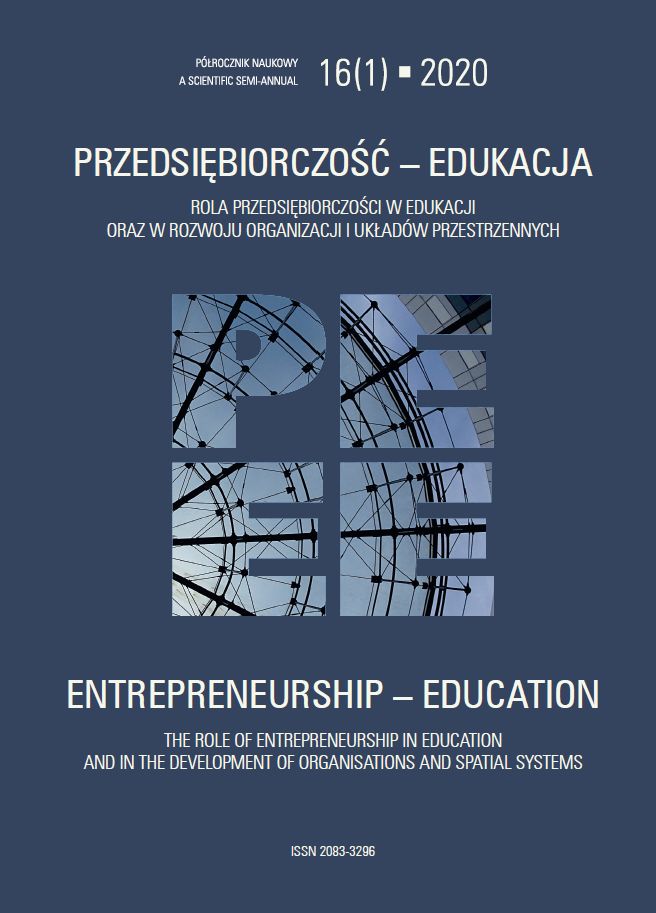Entrepreneurial Activity of Students of Geography and Related Fields: Survey Results of the Universities in the Pomerania Euroregion (Greifswald, Eberswalde, Szczecin)
DOI:
https://doi.org/10.24917/20833296.161.5Keywords:
entrepreneurship, geography, Pomerania Euroregion, studentsAbstract
Entrepreneurship as a result of seeking competitive advantages of modern economies stimulates the growth and socio-economic development of various spatial systems. Therefore, shaping entrepreneurial activity should be implemented at all levels of education. This particularly applies to students who in most cases are not yet decided on their professional careers. There are many factors affecting student entrepreneurship. One of them is the environment, including social norms and cultural codes specific to different countries, regions, etc. They can affect personality traits and ways of thinking, including entrepreneurial thinking. The aim of the study was to analyse the entrepreneurial activity of students of geography and related fields in the cultural approach. The main measurement tool was a survey addressed to students from Greifswald, Eberswalde (Germany) and Szczecin (Poland). As a result of the study, the differences in the entrepreneurial activity of students from Poland and Germany were determined, and personality traits that, according to the respondents, facilitate entrepreneurial activity in each country were identified. Research shows that there are differences in the entrepreneurial activity of Polish and German students. Initiatives taken during studies do not translate into business plans, and the scale and scope of the work undertaken do not coincide well with the interests and field of study undertaken.
References
Czyżewska, M. (2018). Uwarunkowania rozwoju przedsiębiorczości studenckiej na podstawie badań empirycznych. Studia i Prace. Kolegium Zarządzania i Finansów, 160, 29–44.
Garlacz-Sobczyk, K. (2013). Zakłócenia w polsko-niemieckiej komunikacji biznesowej. Sosnowiec: Uniwersytet Śląski.
Łada, A. (2018). Trudne partnerstwo. Polacy i Niemcy o kraju sąsiada, wspólnej historii i Europie. Warszawa: Instytut Spraw Publicznych.
Łuczka, T. (2011). Przedsiębiorczość i postawy przedsiębiorcze studentów – wybrane aspekty. Ekonomiczne Problemy Usług, 63, 150–158.
Nowaczyk, G., Sobczak, A. (2019). Przedsiębiorczość w kształceniu studentów, dorosłych i seniorów. W: T. Rachwał (red.), Kształtowanie kompetencji przedsiębiorczych. Warszawa: FRSE.
Ostoj, I. (2016). Motywy podejmowania pracy przez studentów studiów stacjonarnych – wyniki badań. Studia i Prace WNEiZ US, 44(1), 231–241. doi: 10.18276/sip.2016.44/1-19
Osóch, B., Czapliński, P. (2019). Państwowość jako determinanta intencji przedsiębiorczych młodzieży licealnej uczącej się w międzynarodowej grupie rówieśniczej (na przykładzie Szczecin International School). Przedsiębiorczość – Edukacja [Entrepreneurship – Education], 15(1), 61–74. doi: 10.24917/20833296.151.5
Komisja Europejska. Dyrekcja Generalna ds. Przedsiębiorstw i Przemysłu. (2008). Przedsiębiorczość w szkolnictwie wyższym, szczególnie na studiach nieekonomicznych. Bruksela: Komisja Europejska.
Rachwał, T. (2019). Finanse jako element edukacji o przedsiębiorczości. Bank, IX, 110–111.
Roszkowska-Mądra, B., Parfieniuk, A., Studnicki, M. (2014). Poglądy młodzieży akademickiej studiów ekonomicznych o przedsiębiorczości i determinantach jej rozwoju. Optimum. Studia Ekonomiczne, 6(72), 217–235.
Safin, K. (2014). Przedsiębiorcze zachowania studentów – stan i konsekwencje dla dydaktyki. Horyzonty Wychowania, 13(26), 327–337.
Ścibiorska-Kowalczyk, I. (2017). Kultura ekonomiczna w Niemczech na przykładzie Euroregionu Nysa. Pogranicze. Polish Borderlands Studies, 5(2), 135–157.
Timmons, J.A. (1999). New Venture Creation: Entrepreneurship for the 21st Century. Boston: Irwin/McGraw-Hill.
Wojciechowski, K. (2005). Jak postępować z Niemcami w biznesie i nie tylko/Knigge für deutsche Unternehmer in Polen. Poznań: UAM.
Downloads
Published
How to Cite
Issue
Section
License
Articles are published under the terms of the Creative Commons License (CC BY-ND 4.0; Attribution– NoDerivs).

